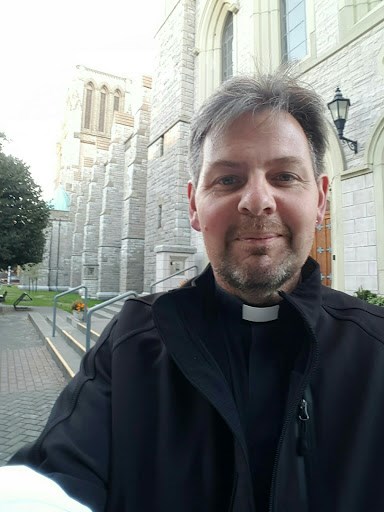Tomorrow ŌĆō Thursday 25th May ŌĆō is Ascension Day. ItŌĆÖs the day where, as we read in the Gospel of Luke and the Book of the Acts of the Apostles (both found in the New Testament part of the Christian Bible), Jesus was taken, bodily, up in to heaven forty days after his resurrection from the dead.╠² It paints a vivid image of Jesus rising up, until he disappears into the clouds and is not seen again.
But where did he go?╠² Up into space? And where did he stop? Is he still going? Scientist Keith Ward tells us that if Jesus took off and kept going he still wouldnŌĆÖt have left the solar system, unless heŌĆÖd discovered warp speed!╠² Which, I confess, is something of a comical image.
So, and I say this as someone who has deep respect and reverence for the Holy book we call ŌĆśThe BibleŌĆÖ which makes up the Scriptures of the Christian Church, I donŌĆÖt believe it. ╠²Or to attempt to be clearer: ╠²I donŌĆÖt believe that this is a literal account of an event which can be empirically proven and verified. I donŌĆÖt believe the ascension.
I do, though, believe in the ascension! Which may seem a strange thing to say!
The difficulty I find, as someone with a fascination for science, and confidence in ŌĆśthe scientific methodŌĆÖ, is that so often we seek to apply such methodology to stories, concepts, beliefs, to which the standard of finding something ŌĆśempirically verifiableŌĆÖ simply doesnŌĆÖt apply.╠² The stories within the Christian Scriptures are not unbiased, literal, accounts of events. The historical narrative is not an unbiased, unvarnished, record of what happened at a particular time. Christian, and I would say any, Scripture is layered with metaphor, poetry, story. It is the product of prayer, reflection, passing on of stories, and ŌĆō ultimately ŌĆō an attempt to put into words what is beyond words; namely, the human struggle to find meaning, and an encounter with a reality which is greater than our imagination. It is trying to put the infinity of God, the Divine, the Ground of all being, into finite words and concepts.╠² It is seeking what is ŌĆśtrueŌĆÖ not in the sense of ŌĆśscientificŌĆÖ or ŌĆśintellectualŌĆÖ truths, but in the sense of a deep engagement with what is real.╠² Even in trying to say what this is and isnŌĆÖt I am struggling for words ŌĆō and IŌĆÖm good at words, itŌĆÖs my thing!
I worked for four years as a Chaplain to one of the foremost Scientific Universities in the world, Imperial College of Science, Technology, and Medicine. It was a great place to work, with some of the greatest minds in the world unravelling the depths of everything from pure math and physics, to how to make stuff go BANG, or not, in Chemical Engineering and Geology.╠² I found many scientists, both students and professors, who were deeply committed to their field, and at the same time deeply committed to their faith, Christian or otherwise. They didnŌĆÖt hold these two things separately ŌĆō many of them saw their studies as complementary to their journey of faith.╠² They realised that the methodology and the motivation for scientific endeavour were not the same as their profoundly held faith views. The two were not contradictory, they worked together in many ways, and in other ways they diverged, and talked about very different categories of reality. Trying to apply scientific method to belief is like trying to explain the colour red to someone who has never seen it, or to describe the effect of a piece of music to someone who has never heard music ŌĆō an impossible task, I would say.
ThatŌĆÖs not to say that faith is, or should be, beyond question. ThatŌĆÖs not to say that faith is not open to examination and to intellectual investigation. On the contrary, any faith should ready and willing to stand up to scrutiny.╠² We who are people of faith are called constantly to think about what we claim to believe, and why.╠² We are to wrestle with difficult questions about the world, and about the way in which we live, and the way in which we engage with everyday realities.╠² We must be open to question.
But when I read the narrative of faith as found in the Bible ŌĆō with stories of burning bushes, virgin births, miracles, resurrection, and even ascension into heaven ŌĆō I donŌĆÖt think in terms of ŌĆ£how can I prove that happened?ŌĆØ ŌĆō I ask the question ŌĆ£what is the meaning behind that story?ŌĆØ or ŌĆ£what is it about that story that reveals something about a deeper reality, about God, or about human beings?ŌĆØ╠² This is, IŌĆÖm sure, how the stories were written ŌĆō not as factual, verifiable accounts, but as multi-layered metaphorical stories which seek to point us towards the Divine and to find meaning within our world ŌĆō to inspire us and challenge us to be people who love, who learn, who grow, who wrestle with the deepest and most painful questions, and who find joy in every moment lived in the presence of God who loves us, and who accompanies us through all of our seeking, finding, losing, living, wondering, and wandering.
 Alastair McCollum╠²is Rector of St. John the Divine Anglican Church in Victoria. He has a passion for the Gospel, motorbikes and bike culture, worship, philosophy, theology, guitars, single malt whisky, real ale, cinema and all things French.╠²You can find Alastair at the church website: ╠²and╠²on his blog:╠²
Alastair McCollum╠²is Rector of St. John the Divine Anglican Church in Victoria. He has a passion for the Gospel, motorbikes and bike culture, worship, philosophy, theology, guitars, single malt whisky, real ale, cinema and all things French.╠²You can find Alastair at the church website: ╠²and╠²on his blog:╠²
You can read more articles from our interfaith blog, Spiritually Speaking,


